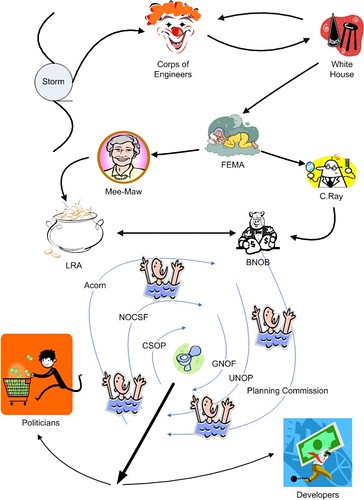I don't know what's worse for New Orleanians
The tragedy of Hurricane Katrina

Washington Post photo by Nikki Kahn.
or the tragedy afterwards?

The New Orleans Recovery Process explained. Graphic © 2006, Mark A. Folse.
If anything, the planning and reconstruction process in New Orleans demonstrates the value of good government, top notch elected officials, and the importance of stellar planning processes and personnel.
Too bad that New Orleans lacks many of the "basic" elements of governmental infrastructure. And the State of Louisiana and the federal government isn't necessarily stepping up to the plate to lend a hand in ways that build capacity and a way forward.
The Think Nola website-blog-advocacy organization has an entry on the latest Community Congress number 3, "America Speaks: A Civic Humiliation." They aren't fond of America Speaks, the public participation consulting firm engaged to assist New Orleanians in this process.
I have written before about America Speaks, in terms of my impressions (negative) especially around the Public Library Planning Process and the "listening sessions." The sessions were set up so that they would only listen to the answers to the questions they offered--discourse outside of the questions was not sought out and only acknowledged on a limited basis.
See:
-- DC Library Planning and Listening Session: A Bit on Last Night
-- Can't seem to face up to the facts... or citizens/public meetings as "arm candy"
-- Disconnected public officials (Alaska and Virginia)
-- John Hill, DC's new "Reading Teacher"?
This troubled me for some time. Then I had an aha! moment...

Image from Badsey Publications.
...while reading some from Planning in the Public Domain (a somewhat difficult book about developing a radical planning discourse).

This diagram from the book outlines the basic concepts of understanding the process of change within a political system. (Click through for a larger image.)
I wrote this up in "Tyranny of Process in New Orleans." But here is the gist:
Friedmann differentiates between system maintenance, system change, and system transformation (significant change).
Maintenance is about bureaucracy and keeping things as they are. Transformation is about challenging the way things are, by working through political means. But ultimately, all change is about maintaining the political system, which occurs through the integration of change.
At first proposals are radical but get bounded and mediated in the process of getting adopted. In the end, radical becomes bureaucratic! (Reading Friedmann often depresses me because I joke to myself that I am merely working to reduce the most blatant excesses of the system and the Growth Machine.)
It occurs to me that America Speaks and similar organizations are more about mediating discourse, and limiting the possibility of transformation. Most of the elite see little need for transformation and radical practice. (In Friedmann's model, radical practice challenges the status quo, but unlike revolutionary practice, it doesn't challenge the state as the ultimate expression of the people.)
Unless they insist on a commitment to unconstrained participation in their terms of engagement, by "working within, taking orders from, and legitimating the powers that be" public participation firms usually assist in the narrowing of discouse, constraining the parameters of democracy, and certainly limiting creativity and innovation and the possibilities and vision that should be on the table. But in the end, the contracting agency still gets to check off the box for public participation.
Index Keywords: civic-engagement



0 Comments:
Post a Comment
<< Home